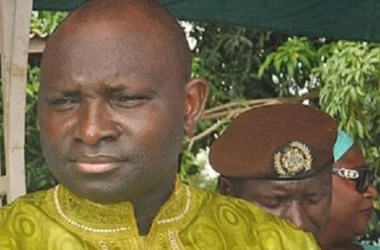
(JollofNews) – The government of the Gambia will seek the extradition of the country’s former minister of the Interior, Ousman Sonko, from Switzerland, new Interior Minister Mai Ahmad Fatty said on Friday.
Mr Sonko was arrested in January by Swiss authorities following a request for asylum.
His arrest was triggered by a complaint from Geneva-based non-governmental organisation, Trial International, in connection with his alleged role in the arrest, torture and disappearance of opponents of the former Gambian regime of Yahya Jammeh.
Although Mr Sonko is yet to be formally charged with any crime, the Government of the Gambia wants to question him in connection with the torture and enforced disappearances of Gambians including Solo Sandeng, organising secretary of the United Democratic Party (UDP).

Mr Sandeng was killed in state custody last April following his arrest for taking part in an unauthorised protest against the Jammeh regime. His remains were exhumed on Wednesday and currently undergoing examination at the Edward Francis Small Teaching Hospital in Banjul.
“The Ministry of the Interior intensifies its investigations into enforced disappearances as the unmarked grave of the late Patriot Mr. Sandeng was discovered and remains exhumed – inconceivably painful experience,” Interior Minister Fatty wrote on his Facebook page.
” The Missing Persons Panel I constituted continues to work on all leads around the country, and fourteen junglers are under custody, some already on trial for torture and murder, including former NIA DG Yankuba Badjie. I have authorized and invoked international criminal repatriation cooperation processes regarding those out of the jurisdiction for fugitives like Ousman Sonko, etc, and there is success with Bora Colley.”
Ousman Sonko was the enforcer of the Jammeh regime. The former army captain once named himself a ‘Bai Faal’ key follower of Mr Jammeh who is eager and ready to execute his command.
He regarded the opposition as a bunch of troublemakers and unpatriotic Gambians who want to destroy the achievements of the Jammeh regime.
















Much easier to achieve judicial extradition of the Sonkos, or in future the Jammehs of the former regime, if the current government were to abolish the dead penalty, for with the dead penalty still in the status books in the Gambia, would be extradites would simply claim that they will be put to dead if extradited, making it very difficult and time consuming to achieve their extradition.
Indeeed Scared. The new government has made its intention clear about abolishing the death penalty ASAP. Remember it was Lord Chief Justice Hassan Babucarr Jallow who, as Attorney General back in the 1980s abolished the death penalty. It will be done soon and I don’t think it will hold up any extradition – as all the Gambian Government needs to do is give an undertaking that the death sentence will not be imposed in the particular case. The new Gambian Government has much trust and goodwill internationally – at the moment.
Dormu Rewwum Gambia (aka Luntango Suun Gann Gi), Lol, I love that “at the moment” yep, as long as he boogie down hard to the fiddlers tune.
Great to know there are plans to abolish the highly unsavoury death penalty in the Gambia. But the fact of it still being on the status books means that there still exist the possibility, no matter how remote that people can legally be put to death in the Gambia – and that is the issue.
After all, it is not difficult to imagine defense lawyers in extradition cases (and yes would be extraditee are entitled to a defence lawyer – possibly paid by the state of the jurisdiction hearing the case) latching on the argument that the very existence, and possibility of the death event, makes it extremely inhumane, and therefore either unlawful, or unconscionable for the court to proceed with extradition etc: And in that event the Gambia would be at a disadvantage, since it had a recent record of putting people to death for similar, and lesser crimes – albeit under another government -, but that would be neither here, nor there by a properly prepared defence lawyer, since for them “its always better to be safe than sorry in cases where people can [legally] be put to death”, and would firmly refuse to give any weighting to any government’s undertaken not to invoke its own laws,[let alone an African Government] etc.
Thus a quick action to abolishing the [heinous] death penalty in the Gambia should help reduce, if not completely take away the weighting, as it were, any arguments that the subject COULD be put to death in the Gambian situation.
In that regard it’s also important to remember that, we don’t any adverse precedences being set via this case, that similar jurisdictions can apply when we, at a latter stage, wish other would be fugitives, to be extradited for crimes committed in the Gambia. Moreover, once extradition has been refused outright, or stayed, such that it drags out for years and years (remember the lawyer is being paid retention money for as long as it takes to resolve the case), we would have in effect given our would be fugitives the excuse they always needed to [temporarily, extended temporarily etc] stay away from Gambian Territory. There it makes some sense to work fast to minimise that risk, in-house, rather than rely solely on the goodwill of outsiders, or indeed on our [somewhat tarnished over the past 222 years when it comes to such things] reputation for an ability to legally repatriate back to The Gambia, peoples we want for questioning about their role in serious crimes.
In this matters, it probably does not hurt if we can first “keep your own house in order(according to international norms) before asking for outside help”.